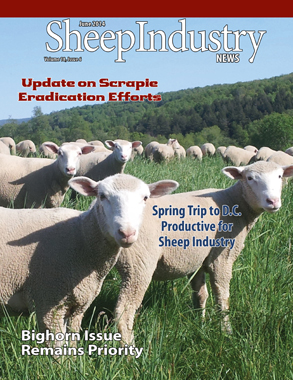
- June 2014
- President’s Notes
- Market Report
- Scrapie Eradication Remains Goal, but APHIS Hesitant About Timeline
- ASI Hosts Productivity Improvement Committee
- ASI’s 150th Blankets and Pillows Available Soon
- News Briefs
- Spring Trip to Nation’s Capital Called ‘Quite Productive’ for Sheep Industry
- Krebs Reminds Agency of NEPA Regulations in Bighorn Issue
- Superior Breaks Ground on New Facility
- Bighorn “Viability” Regulations Threaten Domestic Industry
- Running Rancher: Ken Wixom Brings Endurance to ASI’s Executive Board
- Study: Grouse Doing Well on Grazed Lands
- ‘Connect to Consumers’ Stressed During IWTO Congress
- Center of Nation Sale Features NSIP Sheep
- Obituaries
‘Connect to Consumers’ Stressed During IWTO Congress
June 2014
Sustainability, provenance and “fibre accountability” were featured highly during the 83rd Congress of the International Wool Textile Organization (IWTO), an annual threeday forum for leaders from all parts of the wool supply chain.
More than 225 representatives from the international wool community attended the event, held this year in Cape Town, South Africa. Attendees came from the United State, Argentina, Austria, Australia, China, Mongolia, New Zealand, Norway, South Africa, the United Kingdom and Uruguay.
Congress delegates heard from grassland ecosystem pioneer and biologist Allan Savory, who described how only a system of properly managed livestock will stop the decertification of the planet – a process that is taking place in most of the world’s land.
“Even if we all stop using fossil fuels, we cannot stop de-certification unless we use livestock,” Savory told the audience. One delegate described the message as one of the most important moments in the industry.
Savory’s holistic system of managed grazing has proved successful in countries across the planet, including some of the most damaged grasslands in the world, such as Patagonia in Argentina. Natalie Dudinszky, Sustainable Grazing Coordinator in the Patagonian region, where holistic land management is being implemented, discussed the Merino wool being produced under these sustainable grazing practices – Grassland Regeneration and Sustainability Standard, or GRASS.
The direct traceability of the wool is a crucial advantage in the marketplace, where consumers increasingly demand information about provenance and environmental impact, she said. The traceability point echoes themes made by the Key Note Speaker, renowned South Africa trends analyst Dion Chang. Emphasizing the connection consumers feel to a brand when they understand the process behind the product, Chang urged delegates to remember that wherever they are in the supply chain, they are hooked into the ultimate user.
“The wool industry must move quickly and surely to put environmental support for wool on table,” said IWTO President Peter Ackroyd, speaking in his capacity as CEO of The Campaign for Wool. IWTO, as the globally recognised authority for standards in the wool trade, has worked with the Campaign for Wool since its inception in 2010 to provide scientific support for wool’s environmental and health benefits.
Other Congress sessions included a presentation on research into wool recycling by Prof Stephen Russell of the University of Leeds and Dr Paul Swan, General Manager for Research at AWI, Australia; innovations in wool in sleepwear and extreme condition apparel by Jo Dawson, CEO of H. Dawson, United Kingdom and Trond Sleipnes, Marketing Director of Devold, Norway, respectively; waste water management in the wool scouring process presented by Pedro Otegui, Director of Lanas Trinidad, Uruguay; an overview of the new chlorine-free “Superwash” standard by Kurt Haselwander, CEO of Schoeller Group, Austria; and a market intelligence session featuring South African economist Dawie Roodt.

